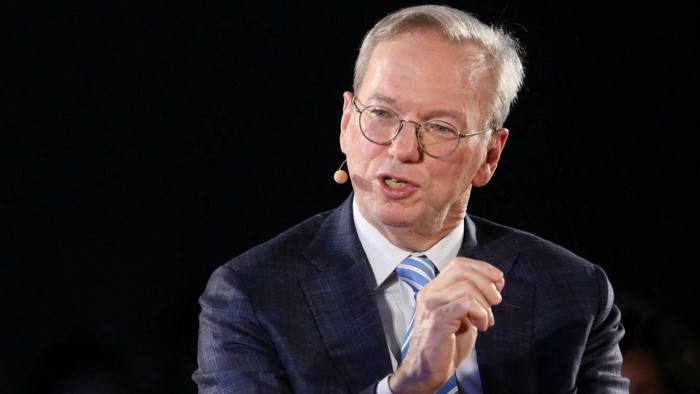FCC Auction 107
Eric Schmidt: FCC C-Band Auction Dooms U.S. 5G Future
In an opinion piece published in the Financial Times (paywall applies), former Google CEO Eric Schmidt, former CEO of Google, said that the FCC’s C band auction would threaten U.S. telcos by drastically increasing their debt loads. “It is a digital setback that America and its allies can ill-afford,” Schmidt said. Here are other excerpts from Schmidt’s FT op-ed:
FCC Auction 107 issued 280MHz in the valuable “C-Band” spectrum (3.7GHz-3.98GHz) — the ideal frequencies for 5G — to mobile telecommunications companies for network development.
But it imposed no meaningful requirement to build necessary network infrastructure. The massive sums winners paid for the spectrum will reduce their financial capacity to actually use it. Instead, it will probably result in disinvestment and downsizing.
At the same time, $81bn is merely a trifle for the U.S. government, equivalent to less than a month of US debt issuance and the money is unlikely to be spent on the 5G network the country needs. The outcomes are predictable: Americans will face higher prices and weaker digital services — yesterday’s internet tomorrow.

That is what happened when European telecoms companies paid over the odds during the 3G auctions of the early 2000s. Europe is still recovering from its lost digital decade. At stake are not just internet speeds but preserving prosperity. Today’s leading technology companies are American because U.S. companies built the core components of high-speed data infrastructure in the 4G LTE era, which meant their software was positioned to succeed. That is not the case for 5G.
Only 24 per cent of Europeans had access to a 5G network last autumn. US 5G is more marketing than a true step change in data speeds. In contrast, China will soon have a national network with speeds of 1 gigabit a second. With China’s head start, the next generation of technology giants — and the products and services they build — are not going to be European or American but Chinese.
My research team estimates that a gigabit C-band network covering 80 per cent of Americans will require 1m new cell sites and cost $70bn to build. Without it there will be no 5G, and no base on which to build 6G. America’s digital economy will become an also-ran. We need aggressive, innovative strategies to prompt rapid infrastructure buildout. It will show the world that there are viable alternatives to Chinese digital hegemony.
Here are three ways to do it:
- Congress should use the proceeds of Auction 107 for a special data infrastructure fund to provide direct aid to states that build physical 5G infrastructure.
- The money could be allocated to promote rapid and equitable buildout.
- The foregone revenue would be recouped by the documented economic boost brought by higher data speeds.
If the FCC auctions more spectrum, it should insist on getting infrastructure (built by the winning bidders). A true 5G network will require more than the C-Band auction’s 280MHz of spectrum.
Japan, China, South Korea, the UK and Canada will assign an average of 660MHz of mid-band spectrum each for 5G by 2023. Future auctions must set stringent build requirements, with penalties for underperformance.
Pursue alternatives to auctions. The defence department has proposed sharing government-controlled spectrum with commercial providers if they build infrastructure quickly.
Auction 107 has put what could be the penultimate nail in the coffin of U.S. global technology leadership. Policymakers must pursue all available means to bolster digital infrastructure rather than focusing on filling government coffers.
……………………………………………………………………………………………..
Although the identity of bidders and how much they’ve committed to spend will not be revealed until the assignment phase of Auction 107 is completed, there are signs operators shelled out much more than they anticipated.
Analysts at Credit Suisse, for example, reckon that AT&T, T-Mobile and Verizon will need to increase their aggregate debt load by a quarter, to $400 billion, to finance their expected purchases.
Ed Cholerton, who was recently promoted to Nokia’s president for North American customer experience, said, “Countries that seek to pad the treasury with these license fees hold back deployments and put themselves at disadvantage to China and others who don’t go down this path.”
Analysts at New Street Research have most recently estimated that AT&T would spend $24 billion on C-band, with Verizon estimated at $29 billion and T-Mobile at $13 billion. Meanwhile, analysts at Cowen have estimated AT&T’s C-band spend at $20 billion; Verizon’s at $35 billion; and T-Mobile at $10-15 billion.
AT&T recently filed an SEC Form 8-K, indicating that it has secured a $14.7 billion term loan credit with Bank of America, and that the purpose of the loan may include “financing acquisitions of additional spectrum.”
Schmidt Futures estimates that a gigabit C-band network, covering 80% of Americans, will require 1 million new cell sites and cost around $70 billion to build. “Without it there will be no 5G, and no base on which to build 6G,” said Schmidt. “America’s digital economy will become an also-ran.”
…………………………………………………………………………………………………………………………………………………………………………………………..
References:
https://www.ft.com/content/dca96eaf-8262-42d8-a95f-d255642e9c7a
https://www.fiercewireless.com/5g/nokia-s-head-u-s-sales-worries-about-c-band-costs
Analysis: FCC’s C band auction impact on U.S. wireless telcos
Assessment of COVID-19 impact on telecom industry; C-Band Spectrum Update


